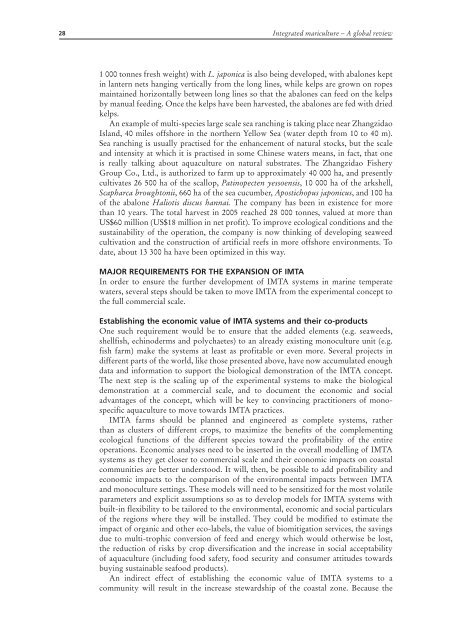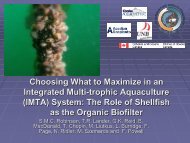Integrated multi-trophic aquaculture (IMTA) in marine temperate waters
Integrated multi-trophic aquaculture (IMTA) in marine temperate waters
Integrated multi-trophic aquaculture (IMTA) in marine temperate waters
Create successful ePaper yourself
Turn your PDF publications into a flip-book with our unique Google optimized e-Paper software.
28<br />
<strong>Integrated</strong> mariculture – A global review<br />
1 000 tonnes fresh weight) with L. japonica is also be<strong>in</strong>g developed, with abalones kept<br />
<strong>in</strong> lantern nets hang<strong>in</strong>g vertically from the long l<strong>in</strong>es, while kelps are grown on ropes<br />
ma<strong>in</strong>ta<strong>in</strong>ed horizontally between long l<strong>in</strong>es so that the abalones can feed on the kelps<br />
by manual feed<strong>in</strong>g. Once the kelps have been harvested, the abalones are fed with dried<br />
kelps.<br />
An example of <strong>multi</strong>-species large scale sea ranch<strong>in</strong>g is tak<strong>in</strong>g place near Zhangzidao<br />
Island, 40 miles offshore <strong>in</strong> the northern Yellow Sea (water depth from 10 to 40 m).<br />
Sea ranch<strong>in</strong>g is usually practised for the enhancement of natural stocks, but the scale<br />
and <strong>in</strong>tensity at which it is practised <strong>in</strong> some Ch<strong>in</strong>ese <strong>waters</strong> means, <strong>in</strong> fact, that one<br />
is really talk<strong>in</strong>g about <strong>aquaculture</strong> on natural substrates. The Zhangzidao Fishery<br />
Group Co., Ltd., is authorized to farm up to approximately 40 000 ha, and presently<br />
cultivates 26 500 ha of the scallop, Pat<strong>in</strong>opecten yessoensis, 10 000 ha of the arkshell,<br />
Scapharca broughtonii, 660 ha of the sea cucumber, Apostichopus japonicus, and 100 ha<br />
of the abalone Haliotis discus hannai. The company has been <strong>in</strong> existence for more<br />
than 10 years. The total harvest <strong>in</strong> 2005 reached 28 000 tonnes, valued at more than<br />
US$60 million (US$18 million <strong>in</strong> net profit). To improve ecological conditions and the<br />
susta<strong>in</strong>ability of the operation, the company is now th<strong>in</strong>k<strong>in</strong>g of develop<strong>in</strong>g seaweed<br />
cultivation and the construction of artificial reefs <strong>in</strong> more offshore environments. To<br />
date, about 13 300 ha have been optimized <strong>in</strong> this way.<br />
MAJOR REQUIREMENTS FOR THE EXPANSION OF <strong>IMTA</strong><br />
In order to ensure the further development of <strong>IMTA</strong> systems <strong>in</strong> mar<strong>in</strong>e <strong>temperate</strong><br />
<strong>waters</strong>, several steps should be taken to move <strong>IMTA</strong> from the experimental concept to<br />
the full commercial scale.<br />
Establish<strong>in</strong>g the economic value of <strong>IMTA</strong> systems and their co-products<br />
One such requirement would be to ensure that the added elements (e.g. seaweeds,<br />
shellfish, ech<strong>in</strong>oderms and polychaetes) to an already exist<strong>in</strong>g monoculture unit (e.g.<br />
fish farm) make the systems at least as profitable or even more. Several projects <strong>in</strong><br />
different parts of the world, like those presented above, have now accumulated enough<br />
data and <strong>in</strong>formation to support the biological demonstration of the <strong>IMTA</strong> concept.<br />
The next step is the scal<strong>in</strong>g up of the experimental systems to make the biological<br />
demonstration at a commercial scale, and to document the economic and social<br />
advantages of the concept, which will be key to conv<strong>in</strong>c<strong>in</strong>g practitioners of monospecific<br />
<strong>aquaculture</strong> to move towards <strong>IMTA</strong> practices.<br />
<strong>IMTA</strong> farms should be planned and eng<strong>in</strong>eered as complete systems, rather<br />
than as clusters of different crops, to maximize the benefits of the complement<strong>in</strong>g<br />
ecological functions of the different species toward the profitability of the entire<br />
operations. Economic analyses need to be <strong>in</strong>serted <strong>in</strong> the overall modell<strong>in</strong>g of <strong>IMTA</strong><br />
systems as they get closer to commercial scale and their economic impacts on coastal<br />
communities are better understood. It will, then, be possible to add profitability and<br />
economic impacts to the comparison of the environmental impacts between <strong>IMTA</strong><br />
and monoculture sett<strong>in</strong>gs. These models will need to be sensitized for the most volatile<br />
parameters and explicit assumptions so as to develop models for <strong>IMTA</strong> systems with<br />
built-<strong>in</strong> flexibility to be tailored to the environmental, economic and social particulars<br />
of the regions where they will be <strong>in</strong>stalled. They could be modified to estimate the<br />
impact of organic and other eco-labels, the value of biomitigation services, the sav<strong>in</strong>gs<br />
due to <strong>multi</strong>-<strong>trophic</strong> conversion of feed and energy which would otherwise be lost,<br />
the reduction of risks by crop diversification and the <strong>in</strong>crease <strong>in</strong> social acceptability<br />
of <strong>aquaculture</strong> (<strong>in</strong>clud<strong>in</strong>g food safety, food security and consumer attitudes towards<br />
buy<strong>in</strong>g susta<strong>in</strong>able seafood products).<br />
An <strong>in</strong>direct effect of establish<strong>in</strong>g the economic value of <strong>IMTA</strong> systems to a<br />
community will result <strong>in</strong> the <strong>in</strong>crease stewardship of the coastal zone. Because the



